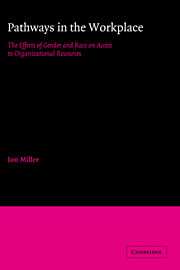Introduction
Published online by Cambridge University Press: 30 September 2009
Summary
The work experiences of men and women, whites and nonwhites, differ. On this much the evidence is clear. Whether these differences resolve into unmistakable patterns of privilege and deprivation involves harder questions, and here the answers are not as clear. The effects of gender and race have been investigated in some detail in labor market studies and surveys of occupational attainment and mobility; as a result, differences in such matters as average pay and aggregate career prospects that are justifiably called inequitable are well documented. But except for a handful of notable studies that I will discuss later, comparatively less systematic attention has been given to differences in experiences at the level of daily work activities. It remains to be seen whether the patterns that exist at this level parallel those that have been documented at higher levels of aggregation.
Do levels and means of access to networks of organizational influence and communication differ predictably by race and gender? Are there systematic differences in access to the authority structure? Do the differences that emerge suggest that one group is consistently favored over others? What are the implications of such inquiries for traditional theories of organization? These questions are at the center of my concern here. It is in the immediate work arena that the impersonal forces of the occupational marketplace intersect with the structure of an organization. These two sets of elements, then, provide the backdrop for the personal encounters among individuals who are, in varying degrees, active participants in the construction of their own work realities, and who are in fact likely to use whatever resources are available to them to protect or further their own occupational interests.
- Type
- Chapter
- Information
- Pathways in the WorkplaceThe Effects of Gender and Race on Access to Organizational Resources, pp. 1 - 7Publisher: Cambridge University PressPrint publication year: 1986
- 1
- Cited by



